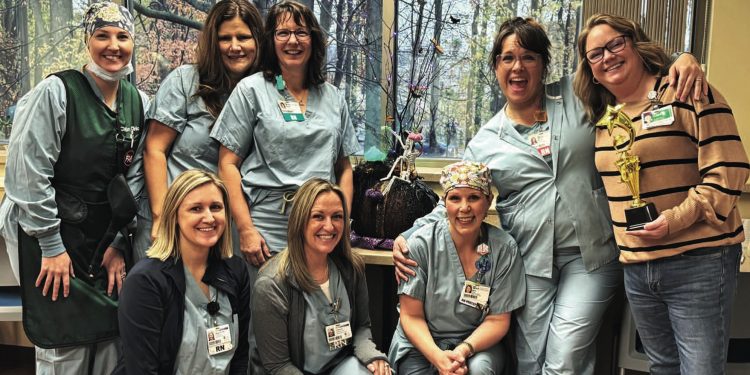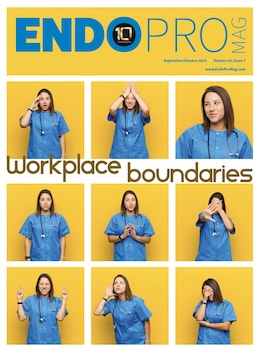Chelsea Hospital’s endoscopy team brings unique expertise to the table and a collaborative spirit that makes all the difference to their patients, according to Lindsey Quinn, RN, BNS, nurse coordinator.
“What truly sets our team apart is our unwavering commitment to excellence in patient care and our deep-rooted culture of support—for both our patients and one another,” Quinn said. “Despite being a relatively small team, we are mighty in our impact.”
The state-of-the-art facility in Chelsea, Michigan, is a joint venture between Trinity Health Michigan and U-M Health and features 16 pre-operative and post-anesthesia care-unit bays, two procedure rooms dedicated to pain management, and four fully equipped endoscopy suites. The staff includes 25 RNs, 12 per-diem RNs, two admin staffers, and seven surgical-care and instrument-care technicians.
In addition to outpatient services, the team also performs endoscopy and pain procedures for inpatients at Chelsea Hospital. The services include diagnostic and interventional procedures such as colonoscopies and esophagogastroduodenoscopies, dilations, banding, tattooing, cauterization, biopsies and snare polypectomies.
But at Chelsea, it isn’t just about the services. Quinn said, “Patient safety and well-being are at the heart of everything we do. We take great pride in the quality of care we provide, ensuring that every patient feels seen, heard, and supported throughout their experience with us.”
The core of that care is how the team takes care of each other.
“We are more than just colleagues,” Quinn said. “We are a work family. Many of us have walked through life’s highs and lows together, celebrating milestones and offering strength during difficult times.” This bond fosters a resilient, positive and supportive work environment that directly translates into better outcomes for the team’s patients.
Quinn’s colleague, Cara Olsen, RN, agreed. “Never have I worked with such a team that works so hard for the patient outcome and experience,” Olsen said. “As a team member you are loved the second you walk through the door. It’s a work family that is there for you in the good times and the bad. This is a rare find in work environments and what makes this team so great in my eyes.”
A few of the elements that make the team effective are the power of consistent communication, an ongoing mutual respect, and a shared commitment to both patient care and team well-being. “We believe that excellence in healthcare starts with a strong, connected team,” Olsen said.
Some best practices include:
Prioritizing patient safety and dignity in every interaction, no matter how routine the procedure may seem.
Maintaining open and honest communication through regular team meetings, daily huddles, and informal check-ins.
Fostering a culture of support and empathy, where team members feel safe to speak up, ask for help, and offer encouragement.
Celebrating wins—big and small—and recognizing each other’s contributions, which helps build morale and a sense of shared purpose.
Staying flexible and adaptable, especially during times of change or challenge, while always keeping patient care at the center of their focus.
Nicole Richardson, RN, has seen this firsthand. “Being in charge you see how much can change in a single day. Cases will be canceled, added, moved up in time slots, and moved locations. During these changes I get to see so many staff members step up, change assignments, and help others to get the job done.”
“Our philosophy is simple,” Quinn said. “When we take care of each other, we’re better equipped to take care of our patients. That mindset has helped us build a resilient, high-performing team that others can learn from.”
That’s not to say Chelsea Endoscopy doesn’t have its challenges. Quinn cited staffing shortages, increasing patient volumes and the far-reaching impacts of the COVID pandemic as some issues the team has had to sort through. “We’ve had to adapt quickly and work together to maintain the highest standards of patient care and safety,” she said.
The team has faced personal challenges, as well. Kimberly Hicks, RN, said part of the reason she loves her team members is because of the way they “come together when each other is navigating a difficult time in our lives. When it comes down to it, we are family and the support we give each other is beyond any other job I’ve ever had.
“What I love about our team is how we always pull together when things are crazy to provide the best care to our patients,” Hicks added. “Our patients would never know that it may be the worst day on the unit for staff because we mask it so well.”
Quinn agreed. “Through it all, we’ve remained a source of strength and support for one another,” she said. “Whether it’s covering shifts, offering a listening ear, or simply showing up with kindness, our team consistently demonstrates compassion not only for our patients, but for each other. These shared experiences have deepened our bond and reinforced our resilience. They’ve shaped us into a team that is not only highly skilled but also deeply empathetic and united by a genuine commitment to care—both within and beyond the walls of our department.”
This enthusiasm is shared by Denise Dembinski, RN, who said, “It’s good to work with people [who] are all committed to taking the best possible care of our patients. And also provide the best support for each other as we navigate life’s ups and downs.”
The team also celebrates achievements and milestones such as retirements, graduations and personal accomplishments— the things that make life rich and fulfilling. These celebrations often extend beyond work hours.
The team has gone on department outings such as renting a chauffeured bus to attend an event together, and they even went camping. In addition to social gatherings, the team holds monthly team meetings to stay connected professionally. These meetings provide a space to share updates, discuss improvements, and ensure everyone feels informed and valued. This ability to balance professionalism with genuine connection is a key part of what makes Chelsea’s work environment so positive and cohesive.
Quinn concluded, “Our exceptional teamwork, mutual respect and shared dedication make us not only effective but also proud of the work we do every day.”






